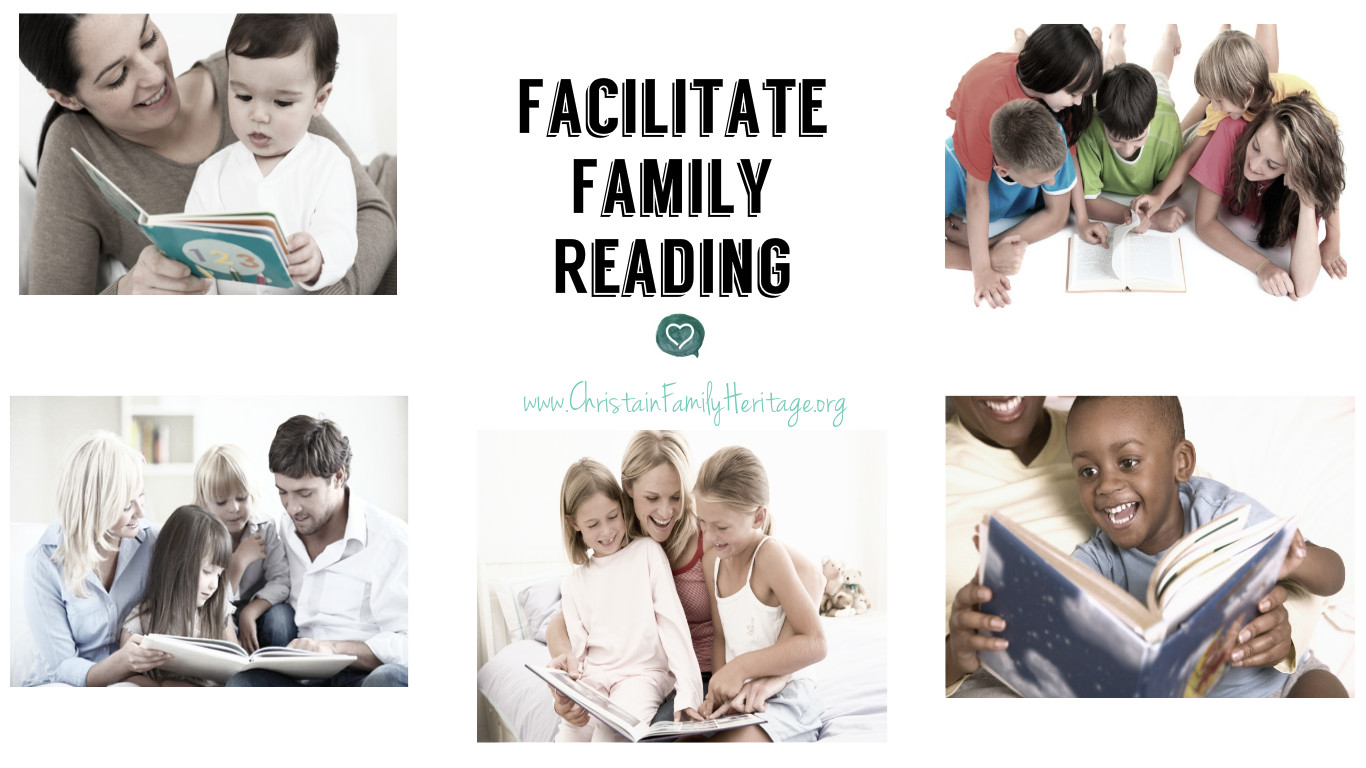 If you are sold on the idea, but feel that the negative aspects of starting and persevering are prohibitive, read on. Any important discipline takes time and patience to cultivate. Here’s what I have discovered about the practicalities of long-term family reading:
If you are sold on the idea, but feel that the negative aspects of starting and persevering are prohibitive, read on. Any important discipline takes time and patience to cultivate. Here’s what I have discovered about the practicalities of long-term family reading:
-
I always choose a book that I can look forward to reading everyday. If I’m not enjoying the book, I don’t read it aloud. My passion for a book must carry the family reading experience. Where there is no vision – family reading perishes.
-
It helps to be accountable. For many years we did family reading in preparation for a reading co-op. Once a month we met with other families who had read the same book. It was called “Book Lovers Club.” The host family named the book of the month and planned an event that celebrated that book. It included fun activities – a food to make and taste, a craft to do, and a game to play based on the plot and characters of the book. We earnestly tried to finish the book in time to attend co-op, which was often better than a birthday party!
-
It is best to cater to the oldest children and let the younger children glean what they can comprehend – and I have been amazed at what they catch by just being in the room! But what they don’t understand now, they will understand better the next time the book is read. For instance, we have read the entire set of The Chronicles of Narnia three times over in the last twenty years (maybe four). Each time the oldest children benefited most, but everyone loved the experience. When the plot or vocabulary is a stretch, I stop and fill in the details so everyone can enjoy the story. But by catering to the oldest children I certainly don’t mean that the younger children don’t get to read age appropriate books with Mommy! They do. But for this designated family reading time I generally read a book that will most interest the oldest children.
-
For many years I had babies or toddlers who couldn’t be expected to enjoy reading chapter books. I usually put them down for their afternoon nap, then gathered the family for reading. When the youngest children were past napping age, I let them roam in and out of the room a bit. Usually they gravitated back because they liked to be with everyone else. For some little children reading time became cuddle time. But for everyone else – I found that most listened better when their hands were busy. Quiet activities that enhanced family reading and still do include: drawing, puzzles, building materials, clay, coloring, computer graphics, knitting, etc. There have been days when I dumped Duplos in the middle of the floor. Other times I read in the kitchen while children stirred up brownies, muffins or cookies (which we ate right after family reading. Yum!). I have even purchased quiet toys that were only used during family reading to keep them special. If children were still struggling, I shortened reading time, then lengthened it gradually over the next weeks and months.
-
A designated time and place are essential to maintaining the habit of reading aloud. I try to choose a time when most of the family will be together. It also helps to pick a time when one part of the daily routine is ending and another is about to begin. The middle of the day works best for us with our schedule.. We usually read just after lunch is cleaned up and just before afternoon school begins, but there are many others times that would work: during an after-school snack, just after dinner (before everyone leaves the table) or just before bedtime.
-
When we have friends visiting they join us for family reading. We give a short overview to catch the newcomer up on the plot and then dive in. In some of these cases I have invited a neighborhood friend inside until we came to a stopping place for the day.
-
It is best not to wait for everyone to be at home to read because it hurts the habit. My husband, Richard, is almost never able to read with us and that is O.K. Once in while he will read a book aloud in the evening, But his is rare treat. Our older children tend to get busy in the mid to late teens and are just not home. I have found myself missing them and wanting to withhold reading until they can be with us. The trouble is that we could be waiting for months! It is better to read on and let them listen in when they can.
-
We often listen to a book on CD on family trips.
-
Reading time must certainly remain flexible. The important point is to consistently prioritize reading.
-
Finally, it’s never too late to begin (or start over). Even empty nesters can benefit from reading aloud together as a couple, and then add grandchildren to the practice as they join the family.




Leave a Reply